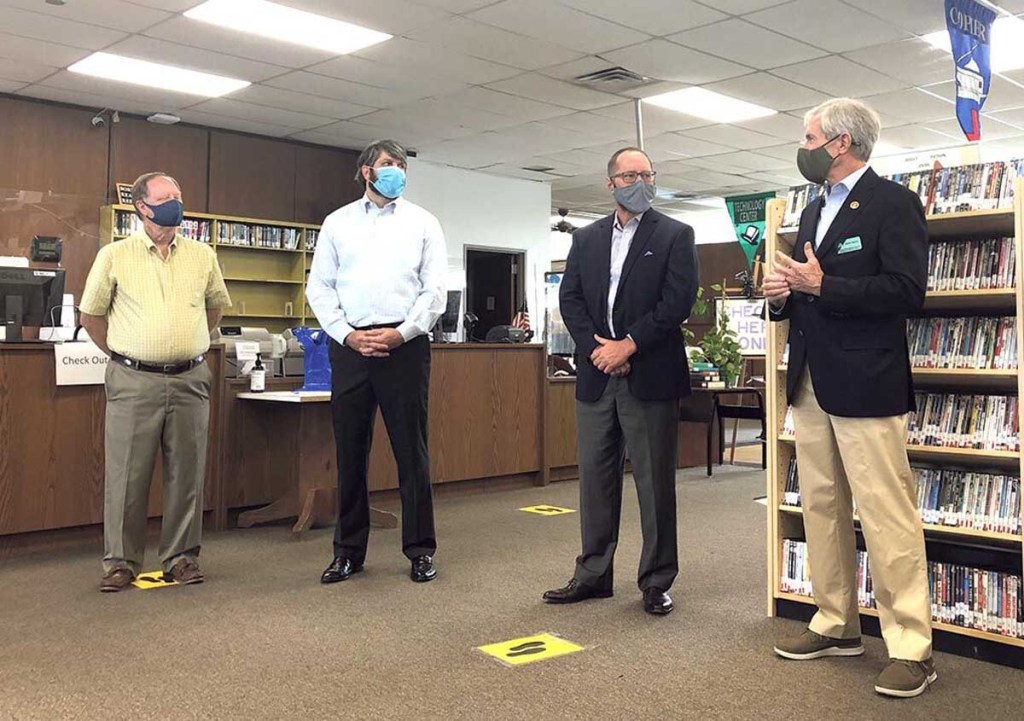Statewide network providing faster internet speeds for public libraries
Published 4:45 am Saturday, August 15, 2020

- From left, Rep. Randall Shedd, Sen. Garlan Gudger, ASA’s Cary Hill and ASC CEO Walter Overby were among those celebrating the high speed internet network ASC is providing for public libraries across the state.
Friday, state and local leaders met at the Cullman Public Library to celebrate the improved internet access being provided by a statewide network connecting public libraries in all areas of Alabama. Funding of the network, provided by the Alabama Supercomputer Authority (ASA), was part of a 2019 legislative rural internet initiative supported by local legislators Rep. Randall Shedd and Senator Garlan Gudger. The Cullman Public Library was connected to the network late last year.
“I want to thank our representatives because without them there would be no money to support the efforts we’ve gone through to provide fiber to all these libraries across the state,” said ASA CEO Walter Overby.
Trending
The network is almost complete and when finished will connect 176 libraries to high speed internet. ASA currently connects 95 percent of schools in the state, along with colleges and universities. “This is just another example of that network and the power it can provide to libraries,” said Overby.
ASA’s Deborah Wallace said legislators came to ASA in 2019 to ask the authority for help in getting broadband internet into the rural areas of the state. “Representatives and senators recognized that internet access in rural areas was not available and there was a great need. This was before the pandemic hit; it’s even more so now,” she said.
The network includes wifi access to the internet from outside the library for after-hours connectivity. “We’ve had so many great compliments on what it’s done,” she added.
Renee Welsh, who is on the board of the Friends of the Public Libraries of Cullman County and also volunteers with an AARP-sponsored program that helps individuals with their taxes, said connection to the network was important to that program.
For security purposes, the computers being used for taxes had to be on a separate server than the library’s and needed to be high speed. “It was seamless internet access, with the ability to log on and log off quickly and change applications,” she said. Even with three to four users at a time, along with regular library patrons online, she said the internet access didn’t falter.
Alabama Public Library Service Director Nancy Pack said before the network was created, 40 percent of the state’s libraries had internet speeds of less than 10 megabytes. “They would have people come to use the resources through the Alabama Virtual Library, and they would get knocked off because of the inability to get into the web or download what they need,” she said.
Trending
Gudger shared a local example of how the internet network is helping people in Cullman. “There’s a gentleman just two blocks away that doesn’t have internet at his house and can’t afford it,” he said. “He comes here, sits in the parking lot for wifi, or comes to my store, for his unemployment,” he said. “The ASA gives people the opportunity to continue the life that they’ve always had.”
“Libraries have evolved to meet the need of the community,” said Shedd, noting one of those needs is helping people access the internet. “We all now know nowadays, if you have to do something the first thing that is said to you is ‘go online.’ It always frustrates me to have a state agency say, ‘You’ve got to go online to do this,’ when people don’t have the ability to go online. So I appreciate this partnership to provide that opportunity to those that don’t have access.”




